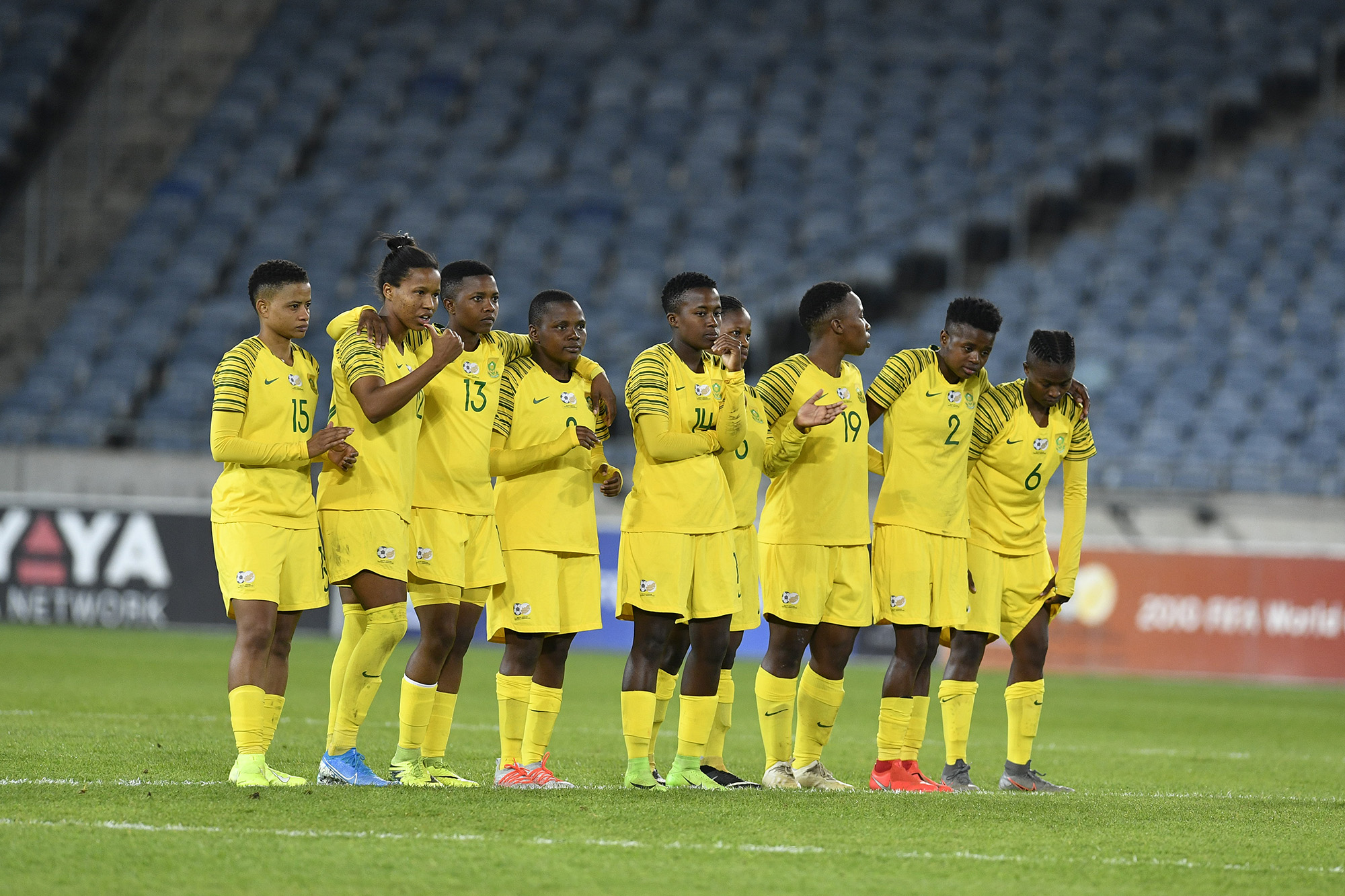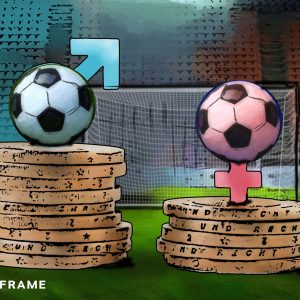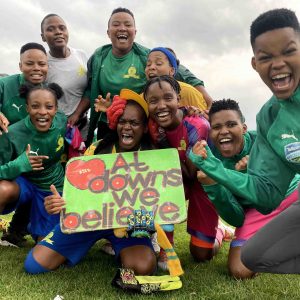Safa carries on disrespecting women’s football
Banyana Banyana will play in the Cosafa Women’s Championship with covered-up Nike kits because the South African Football Association’s new technical sponsor hasn’t accommodated women.
Author:
31 October 2020

The dream that Banyana Banyana’s debut appearance in the Fifa Women’s World Cup would lead to them and women’s football in South Africa being afforded the respect they deserve is slowly dissipating.
While the South African Football Association (Safa) did take steps in the right direction after the World Cup by introducing a more competitive league for women, Banyana and women’s football continue to receive the short end of the stick from the association.
The senior national women’s side will go into the Cosafa Women’s Championship in Port Elizabeth without having properly prepared, for example – having last played in March against Lesotho in a friendly match. While other countries like Zambia and the Mountain Kingdom used the October Fifa international week to prepare for the Southern Africa competition, Safa were mum about preparatory plans for both the defending champions and the national Under-17 women’s side (Bantwana).
The launch and unveiling of Safa’s technical sponsor, Le Coq Sportif, excluded women’s wear. The French apparel manufacturer’s South African website strictly named the kit as Bafana Bafana’s. The series of embarrassing posts unveiling the kit were upstaged by the sight of the Bafana technical team members and reserve players wearing Nike rain jackets in the friendly against Zambia. The old sponsor’s logo was taped over. The French manufacturer hadn’t provided Safa with rain jackets.
The events continued to be more disappointing as Banyana and Bantwana players, who had assembled at Safa’s Fun Valley Technical Centre for their different Cosafa tournaments, were handed the previous sponsor’s garb for the duration of the camp. The women’s sides don’t have any merchandise from the new technical sponsor.
Related article:
Safa’s acting chief executive Tebogo Motlanthe blamed the ongoing lockdown for the women’s teams not having Le Coq Sportif kits.
“That issue is misplaced. The issue of the kit is misplaced by the media. The players and the staff will be dressed and kitted by Le Coq Sportif in the official Cosafa tournament. Remember we are from lockdown, factories had locked down and don’t forget that CAF had said games will start in January but with our improved Covid [restrictions] they [Le Coq Sportif] had to deliver within a short space of time.
“I don’t understand why you want to blow this thing out [of proportion]. Banyana will get the kit of Le Coq Sportif. Banyana official games will be played in Le Coq Sportif,” said Motlanthe.
‘Nothing was planned’
However, Le Coq Sportif sales director Roger Noades sings a different tune.
“It takes eight to 12 weeks to get anything manufactured. Females are gonna get serviced as females, males are gonna be serviced as males, on and off the field. Nothing was planned, nothing was communicated to Le Coq and nothing is gonna happen, specifically, for women for PE [Port Elizabeth]. Those sizes came in this week,” Noades said on 24 October.
Banyana are favourites to win the Cosafa Women’s Championship, which will run from 3-14 November, for a fourth time in a row under coach Desiree Ellis. Despite their dominance in the region, they still have to fight for basic things from Safa.
“Sponsorship was supposed to kick off in January 2021. Everything that is happening is all reactive. As far as the technical sponsor is concerned, yes, men’s and ladies patterns, for on the field and off the field have been planned. The contract was supposed to commence come January of 2021. Anything that’s done from the technical sponsor point of view before then, is just reactive and not planned,” Noades said.
The slow change in the treatment of the women’s game at national level inspires little hope that things will change at club level. The winners of the inaugural Safa National Women’s League, Mamelodi Sundowns Ladies, only received their R500 000 prize money in September, even though the league winners were decided in March. The club hasn’t received the trophy and the medals that come with it, nor do they know what that trophy looks like as there has been no presentation of it.
Related article:
Late payment in women’s football is not a new problem. Examples range from teams waiting for months on end for the Sasol League grants to Banyana players receiving their match fees and allowances way after matches had been played. In 2019, Banyana players were willing to boycott their Winnie Madikizela-Mandela Challenge match against the Netherlands due to unpaid fees, amounting to R75 000 a player. The threat of the boycott forced Safa to sit and speak to the players and this led to an agreement between the two parties and payments soon after. Unfortunately late payments still occur.
“The last time Safa communicated with us regarding the handing out of the medals and trophy was before we received imali yethu (our money) for league honours. To this day, we haven’t heard anything from the association. We are hoping they will come back again and say something,” said Sundowns coach, Jerry Tshabalala.
“The players are disappointed, to this day they haven’t received their medals. They would love to have something that shows ‘I was the first to win the Safa National League’ – but when you don’t have a medal in hand, you didn’t win anything,” said Tshabalala.
What needs to change
Although football, including at amateur levels, has returned under alert level one, the women will have to wait a bit longer for their kick off. Motlanthe says the new season of the Safa National Women’s League will only start in 2021. The first season ended without a sponsor. Having one in the new season would mean that club owners would get some form of relief, digging into their pockets less to make sure that teams meet their match obligations. But it could also mean that the players would be able to receive some stipends for their efforts in the league.
“The NEC has resolved to have the commencement of the league in January. All women’s leagues will start in January,” said Motlanthe.
Former technical director of women’s football at Safa Fran Hilton-Smith says South Africa needs a dedicated women’s football division for things to change. Hilton-Smith, who was forced into retirement over 18 months ago, hasn’t been replaced.
Related article:
“It seems to be going backwards instead of forward. Nobody’s replaced me. They haven’t brought anybody so no one is running women’s football. They need a department to run women’s football,” said Hilton-Smith.
“We need a sponsor so that the league can be run professionally. We need a sponsor because the idea was that the girls would get some money. We also need a national schools football, to have girls playing in the schools. The biggest league in the country is JVW [Schools League], as everybody knows. If JVW [owned by former Banyana captain Janine van Wyk] can do it just in Gauteng, with over 300 schools or something, [it] shows that school football is popular. They should have it for boys and girls. That’s crucial for development.”
Despite what’s happening around them, Banyana have to soldier on and represent the association well by defending their title. This would redeem them from their Olympic qualifier elimination in February at the hands of Botswana.



